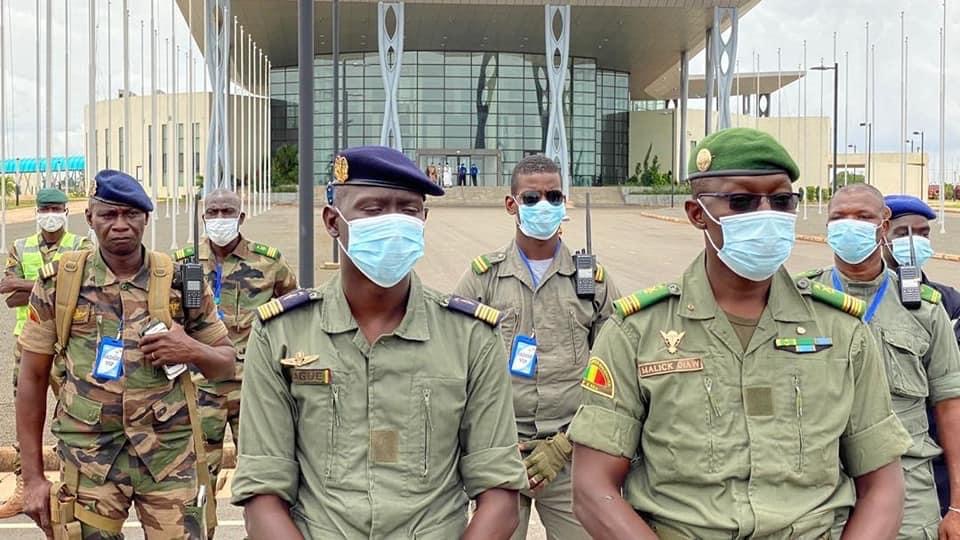
Colonels Ismaël Wagué and Malick Diaw of Mali’s ruling junta.
“Analysts say that while there is no mutually beneficial relationship between jihadist groups and coup plotters, there is a linkage between the increase of jihadism and the protracted insecurity across the region.”
The accompanying excerpted article from the non-profit scholarly publication The Conversation: Africa examines the possible connections between coups and the presence of Islamic terrorists in African states. There have been three coups in West Africa’s Sahel Region in since 2021: Chad, Mali, and Burkina Faso, as well as a fourth failed attempt in Guinea-Bissau. The author found the link between coups and jihad to be complex, with jihadism not necessarily a direct precursor.
The author notes jihadism and coups are precipitated by similar factors such as poverty, inequality, unemployment, ignorance, political instability, and the inability of governments to meet these challenges. These conditions serve as excellent recruiting tools for jihadist groups looking to increase their ranks with jobless, angry youth. These conditions also encourage soldiers, sometimes with a disgruntled populace backing them, to overthrow a corrupt government that is unable to provide for its citizens. Finally, the military is more likely to attempt a coup when the government appears unable to defeat terrorist organizations. This was the case in Burkina Faso, where the military overthrew President Roch Marc Christian Kaboré in January 2022, after feeling their forces were not being adequately supplied to defeat the jihadists and becoming disenchanted as the number of casualties within their ranks grew. Coup leaders often adopt a very militaristic approach to defeating jihadists. Instead of attacking the root causes of discontent, such as high unemployment and lack of essential services, they implement forceful measures that tend to drive the poor into the arms of jihadist recruiters. As such, their harsh measures lead to more jihadist recruits, leading to harsher crackdown measures, and so on. Ultimately, the outcome of the coup-jihadism relationship becomes increased instability. Meanwhile, the African Union and Western nations, see their efforts at democratization and counterterrorism in the Sahel undermined.
Source:
Folahanmi Aina, “Jihadism and coups in West Africa’s Sahel region: a complex relationship,” The Conversation: Africa (non-profit scholarly publication), 17 February 2022. https://theconversation.com/jihadism-and-coups-in-west-africas-sahel-region-a-complex-relationship-176988
Most of these groups are affiliated with global jihadist groups such Al-Qaeda and the Islamic State in Syria and Iraq.
This has led to repeated tensions in relations between the state and society, which the jihadist groups have exploited in intensifying their recruitment drive.
On the other hand, the activities of these jihadist groups have also mounted additional pressure on the fragile democratic systems across the region.
This encourages state capture by the military, who see themselves as “guardians of the state” and the “last hope” of the common citizen.
The continued emergence of coups is likely to be capitalised upon by jihadists as reflecting efforts which are finally yielding desired results – the forced displacement of democratic systems of government. The jihadists could use this as a tactic to get more fighters to join them.The military juntas now in power must urgently seek to establish mutuality with the societies they now rule. It’s a tall order, given that they don’t prioritise the relationship between state and society. Doing so would require giving voice to the concerns and grievances of citizens they rule over.
Image Information:
Image: Colonels Ismaël Wagué and Malick Diaw of Mali’s ruling junta.
Source: Kassim Traoré /VOA/Wikimedia Commons, https://commons.wikimedia.org/wiki/File:Comit%C3%A9_national_pour_le_salut_du_Peuple_-_2020_Malian_coup_d%27Etat_2.jpg
Attribution: Public Domain
